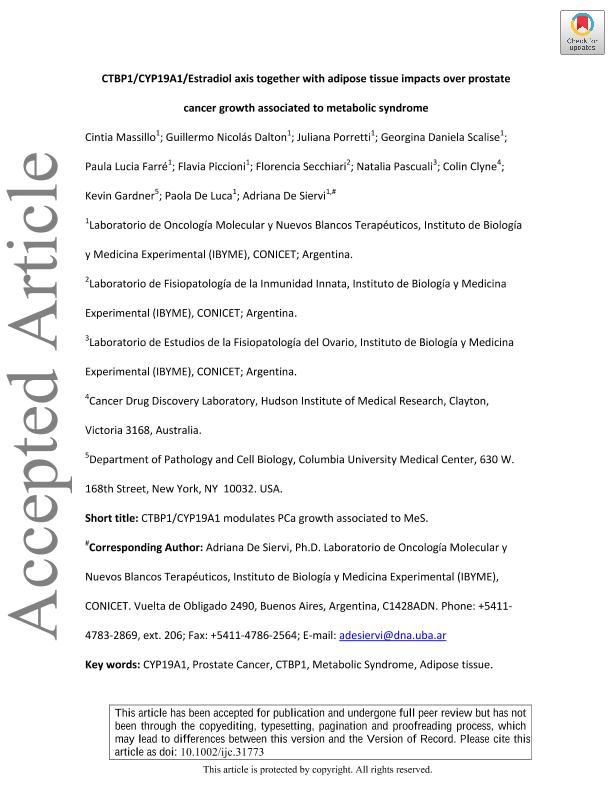Artículo
CTBP1/CYP19A1/Estradiol axis together with adipose tissue impacts over prostate cancer growth associated to metabolic syndrome
Massillo, Cintia Lorena ; Dalton, Guillermo Nicolás
; Dalton, Guillermo Nicolás ; Porretti, Juliana Carla
; Porretti, Juliana Carla ; Scalise, Georgina Daniela; Farré, Paula Lucía
; Scalise, Georgina Daniela; Farré, Paula Lucía ; Piccioni, Flavia Valeria
; Piccioni, Flavia Valeria ; Secchiari, Florencia
; Secchiari, Florencia ; Pascuali, Natalia Marisa
; Pascuali, Natalia Marisa ; Clyne, Colin; Gardner, Kevin; de Luca, Paola
; Clyne, Colin; Gardner, Kevin; de Luca, Paola ; de Siervi, Adriana
; de Siervi, Adriana
 ; Dalton, Guillermo Nicolás
; Dalton, Guillermo Nicolás ; Porretti, Juliana Carla
; Porretti, Juliana Carla ; Scalise, Georgina Daniela; Farré, Paula Lucía
; Scalise, Georgina Daniela; Farré, Paula Lucía ; Piccioni, Flavia Valeria
; Piccioni, Flavia Valeria ; Secchiari, Florencia
; Secchiari, Florencia ; Pascuali, Natalia Marisa
; Pascuali, Natalia Marisa ; Clyne, Colin; Gardner, Kevin; de Luca, Paola
; Clyne, Colin; Gardner, Kevin; de Luca, Paola ; de Siervi, Adriana
; de Siervi, Adriana
Fecha de publicación:
08/2018
Editorial:
John Wiley & Sons Inc
Revista:
International Journal of Cancer. Journal International du Cancer
ISSN:
0020-7136
Idioma:
Inglés
Tipo de recurso:
Artículo publicado
Clasificación temática:
Resumen
Metabolic syndrome (MeS) increases prostate cancer (PCa) risk and aggressiveness. Cterminal binding protein 1 (CTBP1) is a transcriptional co-repressor of tumor suppressor genes that is activated by low NAD+/NADH ratio. Previously, our group established a MeS and PCa mice model that identified CTBP1 as a novel link associating both diseases. We found that CTBP1 controls the transcription of aromatase (CYP19A1), a key enzyme that converts androgens to estrogens. The aim of this work was to investigate the mechanism that explains CTBP1 as a link between MeS and PCa based on CYP19A1 and estrogen synthesis regulation using PCa cell lines, MeS/PCa mice and adipose co-culture systems. We found that CTBP1 and E1A binding protein p300 (EP300) bind to CYP19A1 promoter and downregulate its expression in PC3 cells. Estradiol, through the estrogen receptor beta, released CTBP1 from CYP19A1 promoter triggering its transcription and modulating PCa cell proliferation. We generated NSG and C57BL/6J MeS mice by chronically feeding animals with high fat diet. In the NSG model, CTBP1 depleted PCa xenografts showed an increase in the CYP19A1 expression with the subsequent increment in intratumor estradiol concentrations. Additionally, in C57BL/6J mice, MeS induces hypertrophy, hyperplasia and inflammation of the white adipose tissue, which leads to a proinflammatory phenotype and increases serum estradiol concentration. Thus, MeS increased PCa growth and Ctbp1, Fabp4 and IL-6 expression levels. These results describe, for the first time, a novel CTBP1/CYP19A1/Estradiol axis that explains, in part, the mechanism for prostate tumor growth increase by MeS.
Palabras clave:
CTBP1
,
ADIPOSE TISSUE
,
PROSTATE CANCER
,
METABOLIC SYNDROME
Archivos asociados
Licencia
Identificadores
Colecciones
Articulos(IBYME)
Articulos de INST.DE BIOLOGIA Y MEDICINA EXPERIMENTAL (I)
Articulos de INST.DE BIOLOGIA Y MEDICINA EXPERIMENTAL (I)
Citación
Massillo, Cintia Lorena; Dalton, Guillermo Nicolás; Porretti, Juliana Carla; Scalise, Georgina Daniela; Farré, Paula Lucía; et al.; CTBP1/CYP19A1/Estradiol axis together with adipose tissue impacts over prostate cancer growth associated to metabolic syndrome; John Wiley & Sons Inc; International Journal of Cancer. Journal International du Cancer; 144; 5; 8-2018; 1115-1127
Compartir
Altmétricas



